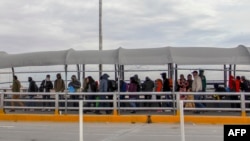Amid a deepening crisis and mass exodus from Venezuela, bipartisan legislation was unveiled Thursday to provide temporary protected status (TPS) to Venezuelan nationals in the United States.
The Venezuela TPS Act of 2019, introduced by U.S. Representatives Darren Soto (D-FL) and Mario Diaz-Balart (R-FL), cites "an unprecedented economic, humanitarian, security, and refugee crisis."
"During [Venezuelan President Nicolas] Maduro's tyrannical rule, Venezuela's economy has deteriorated at alarming rates, causing a scarcity of basic foods and medicine in the country," Representative Soto stated. "Hyperinflation, drastic shortages, and egregious human rights abuses have forced many Venezuelans into exile, and the conditions in Venezuela remain too perilous for them to return," added Representative Diaz-Balart.
TPS designation is granted by the Department of Homeland Security (DHS) to citizens of certain countries suffering from ongoing armed conflict, environmental disasters, or "other extraordinary and temporary conditions."
If enacted, TPS would protect Venezuelan nationals from deportation and permit employment authorization documents for an 18-month designated period.
TPS terminations
Since September 2017, Secretary of Homeland Security Kirstjen Nielsen and her predecessor, John Kelly, have ended TPS for more than 300,000 beneficiaries from six countries, Sudan, Haiti, Nicaragua, El Salvador, Nepal, and Honduras. DHS also extended TPS for nationals of Syria, Yemen and Somalia through next year.
Last October, a federal court in California barred DHS from ending TPS for Sudan, Nicaragua, Haiti and El Salvador.
The injunction, which will last while a class action suit makes its way through the court, shields more than 200,000 people from deportation.
In his ruling, Judge Edward Chen wrote, "There is evidence that the administration may have violated the Constitution when it made decisions to end TPS [for the four countries]. There is also evidence that this may have been done in order to implement and justify a pre-ordained result desired by the White House."
‘Fastest escalating' crisis
In response to VOA's request for comment on the Venezuela TPS Act, DHS Press Secretary Tyler Houlton wrote, "As a matter of policy, we do not comment on pending legislation."
It is unclear how many Venezuelan nationals would benefit from TPS, if enacted.
The Migration Policy Institute has designated the Venezuela crisis as "the fastest-escalating displacement of people across borders in Latin American history," with estimates of displaced Venezuelan nationals varying from 1.6 to 4 million people as of early 2018.





